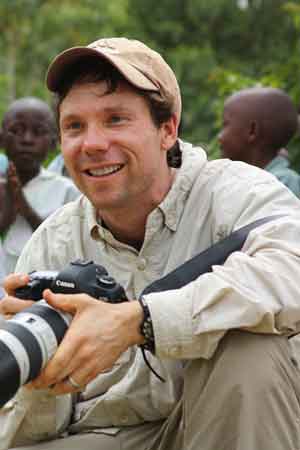 MATTHEWS — David Johnson left a teaching position he enjoyed at a local private school to embark on a new career path 10 years ago. Johnson, a 1994 graduate of Charlotte Catholic High School and UNC-Chapel Hill, stepped away from teaching English to pursue his passion for storytelling – through the eyes of a camera.
MATTHEWS — David Johnson left a teaching position he enjoyed at a local private school to embark on a new career path 10 years ago. Johnson, a 1994 graduate of Charlotte Catholic High School and UNC-Chapel Hill, stepped away from teaching English to pursue his passion for storytelling – through the eyes of a camera.
“For years I spent every summer serving different non-profits and ministries in a variety of ways,” Johnson recalls. “One of the ways I helped was writing. I always brought my camera. I became an amateur journalist for a lot of the smaller ministries. After several summers of doing that I felt the call and really just saw the need.
“It’s a beautiful blend when those two come together, when you see a need in the world and you simultaneously receive a call from the Lord to go and meet that need.”
His first project landed him in Darfur, Sudan. Johnson documented the genocide there for a nonprofit ministry.
“That was our pilot project. We didn’t have a name or anything yet. I was just kind of carrying my camera around and taking notes and telling the stories. It was there that things formalized for me as to what I wanted to do,” he remembers.
When he came back from Sudan, Johnson gathered other Christian photographers and filmmakers to create a nonprofit and serve the impoverished.
Johnson says Proverbs 31:8, “Open your mouth in behalf of the mute, and for the rights of the destitute,” became the foundational verse for the mission of his nonprofit ministry, Silent Images.
“That is why we use our cameras to speak out and tell stories for ministries around the world,” he says. “I always loved photography and creative writing. I was always dabbling in the arts one way or the other. I took some classes in college but I am mostly self-taught.”
Johnson notes that the work that Silent Images does employs the gifts of each team member to help others.
“Anytime you use your gifts to help someone else, it’s more satisfying than any paycheck. The mission is much more rewarding than any paycheck,” he reiterates.
“It’s completely rewarding to offer someone an opportunity to share their story. In a culture that is noisy and fast-paced, we don’t take time to listen to each other’s stories. I think it is stories that connect us. Jesus used them. He always used stories to connect them to people. They’re powerful.
“It’s such a dignifying experience to sit down with someone, whether they’re poor and in a desolate situation in the middle of Africa, or homeless here in Charlotte, or a victim of human trafficking. They all have a story. Many of them have a story of redemption.”
That’s one of Silent Images’ taglines: telling stories of hope in the midst of injustice.
“The mass media love to tell stories of horror, division and chaos,” Johnson says. “There’s more to the story. That’s just part of the bigger story that is unveiling. If we gravitate to that for too long, we become pretty hopeless. We almost forget that God’s hand is still in this story and He’s redeeming people in the midst of really hard situations.”
He explains that even though Silent Images might be telling stories of poverty, or oppression, or genocide, or human trafficking, or homelessness, “we are really looking for that silver lining, for those moments of hope, of those moments where God is taking people and restoring them and offering a different narrative to our world.”
He believes their work dignifies the people they depict. “Hopefully it glorifies God and pleases Him that those stories are being told. Ultimately, it also serves that ministry and opportunity and helps them tell their story better,” he says.
Johnson notes that Silent Images exists to make storytelling affordable to ministries.
They typically work on more than 150 projects per year, with 300 productions created as a result of those projects last year alone. They currently have 40 projects in the works around the world. They have an ongoing project in Burma and have satellite offices in South America and Africa.
“We’re getting ready to serve some Catholic nuns in Mexico. We also do work with the Pregnancy Resource Center in Charlotte. And we have told stories of refugees here in Charlotte,” Johnson says.
Silent Images donates the profits from photography exhibits and book sales to non-profits. So far they have given more than $75,000 to the non-profits they have helped.
Johnson is excited for the fall release of “Queen of Katwe,” a full-length Disney feature film on Phiona, a world champion chess player from the slums of Uganda. Silent Images originally filmed her back in 2011 and was asked if they would provide some of their footage to be used in the movie.
“We did the original production of that five years ago,” Johnson explains. “We did the first video on Phiona. ESPN approached us and bought some footage from us, which was great. We were able to donate the money back to the chess camp.”
Silent Images is hoping to tell more stories going forward, Johnson says. In addition to photography and videography, he travels to schools and non-profits giving talks to students and people interested in making a difference in the lives of others.
“We would love to serve more non-profits,” he says. “We’re always looking for more non-profits to help.”
— SueAnn Howell, Senior reporter
Get more info
Would your nonprofit organization like to work with Silent Images? For more information, go to their website at www.silentimages.com


